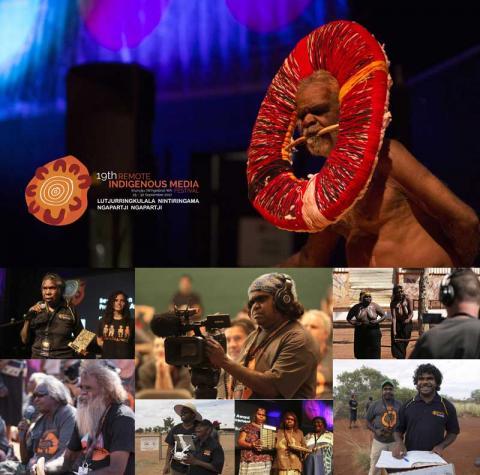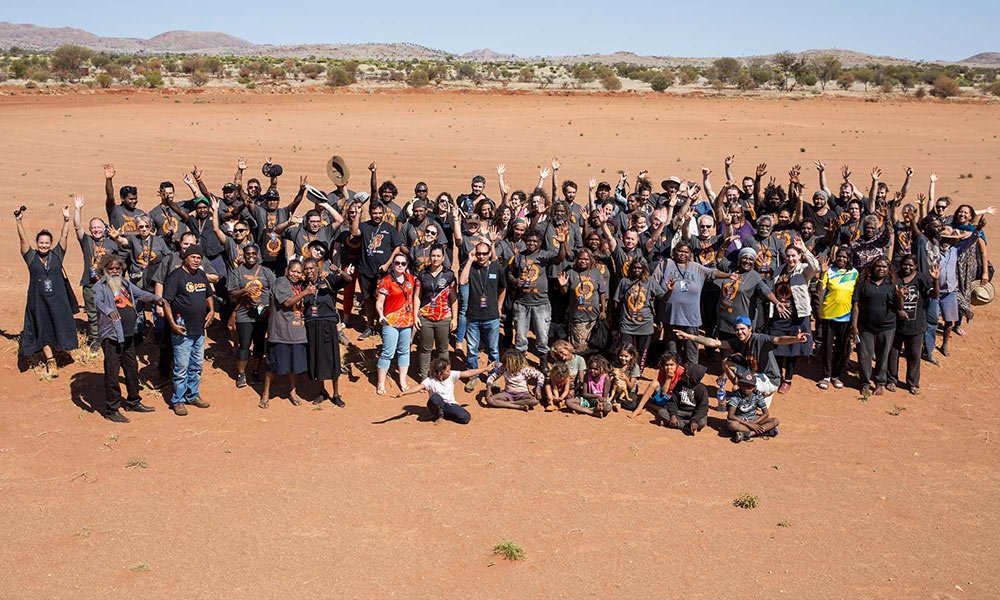
Lutjurringkulala Nintiringama Ngapartji Ngapartji
Come Together to Learn and Share
The remote desert community of Irrunytju (Wingellina) almost doubled its population to accommodate over 100 remote media workers, artists and industry affiliates from across Australia for the invigorating 19th Remote Indigenous Media Festival last week. The week-long event co-hosted by Indigenous Remote Communications Association (IRCA) and Ngaanyatjarra Media (NG Media) affirms the remote Aboriginal and Torres Strait Islander media industry as a powerful and connected voice for generations to come.
Delegates travelled the long red desert highway to be welcomed to Country, culture, big night skies and Tjukurrpa by Irrunytju traditional owners and community leaders. The opening ceremony featured opening ceremony featured a Turlku (dance) performance of the Minyma Kutjara (Two Sisters) Story that passes Irrunytju community.
Each morning, delegates were engaged in forums and meetings discussing sector accomplishments, developments and strategies. The week included the full spectrum of desert weather, from heat and dust storms to rain and cold, but this didn’t deter the media workers. Dedicated delegates acquired new skills in state-of-the-art media workshops, including radio podcast, sound skills, digital photography and design, stop-motion animation and aerial cinematography with drones. The Remote Indigenous Media Awards highlighted the rich and colourful media fabric that stretches from the desert to the sea. The presentations celebrated the achievements of the sector with Roma and Simon Butler from NG Media taking out the prestigious Preston Memorial Award for Lifetime Achievement. The nightly cinema showcased community produced media from across remote Australia, including Carry the Flag and Laramba Possum Dreaming (PAW Media).
Irrunytju is on the Ngaanyatjarra lands of WA, located near the tri-state border of WA, SA and NT. With a population of approximately 150 people, mostly Pitjantjatjara, Irrunytju is the home of Festival co-host NG Media, a pioneering Aboriginal-owned media organisation supporting 14 remote communities in the Western Desert region of Western Australia. Their 25th anniversary coincided with the Festival and their history and achievements were honoured throughout the week, including: their new Outside Broadcast truck, upgrades to the NGM Radio network and playout software, award-winning video productions, music recordings and label launch, telecommunications access and IT training and access facilities across the region, and tradition of keeping culture and language strong through Tjukurrpa re-enactments and staging of Turlku and music events.
Daisy O'Byrne, IRCA Board Member and NG Media Minyma Chairperson, said “This year’s Festival has been a huge project with the whole community getting involved. We are proud to have welcomed so many media workers who travelled a long way to be here. Lutjurringkulala nintiringama ngapartji ngapartji was the theme for the Festival and it means come together to learn and share. We shared our Turlku/Inma (traditional dances), visited special sites, and showcased our art and music. We learnt and shared so much this week, new media skills and industry knowledge. We celebrated, exchanged stories and shared songlines. The Festival has strengthened our remote media sector and inspired our young people.”
On the last day, the outcomes from the skills workshops were presented a showcase, demonstrating the depth of participants’ creativity, determination and talent. There was a vibrant Art Market featuring paintings by local artists from the Minyma Kutjara Arts Project, as well as artworks and jewellery made from found materials created in an arts workshop held throughout the week. The Festival wrapped up with a spirited concert featuring Irrunytju Band, Blackstone Band, the Red Sands Beat Band and Desert Rain.
IRCA acknowledges the significant contribution from NG Media and the Irrunytju community, school and local agencies, as well as our funding partners and sponsors; the Australian Government, Western Australian Government, Lotterywest, Community Broadcasting Foundation, Screenwest, Ngaanyatjarra Council, Country Arts WA, Foundation of Rural & Regional Renewal, Brian Tucker Accounting, Australian Film, Television and Radio School, Community Media Training Organisation and Desart.
Those unable to attend tuned into the outside broadcast throughout the week over RADIO NGM or 107.7FM, and on other regional radio networks across the country. Highlights of the event are on the IRCA Facebook page and on Twitter #rimf.

Download high resolution 2017 Festival photos: https://www.flickr.com/photos/irca/albums/72157687228250474/with/37443821281/
Watch the 2017 Festival promotion: https://vimeo.com/228601974
For more information about the 19th Remote Indigenous Media Festival visit http://www.irca.net.au/festival
TESTIMONIALS FROM THE FESTIVAL
“The Festival is important for us working in remote communities because it gives us the opportunity to meet up with other people in our media industry. We are also able to find out what is available for us working in Indigenous media. The workshops help us strengthen and learn new skills. I will be more proactive in podcasting when I get back and will share the experiences from the workshop with others in my community.
Sylvia Tabua, Torres Strait Islanders Media Association
“The Festival is important for getting all people together from the media industry to network, share stories, knowledge and technology. I came to the Festival to network with other media workers and ICTV contributors and will take back new digital photography skills to use in my work.”
Gina Campbell, Indigenous Community Television (ICTV)
Indigenous Remote Communications Association (IRCA) is the peak body for Aboriginal and Torres Strait Islander media. Founded in 2001 as the peak body for remote Indigenous media and communications, we undertook a structural change and expanded our membership and role to become the national peak body in 2016/2017. Up to 105 Remote Indigenous Broadcasting Services (RIBS), 33 additional licensed retransmission sites across Australia, 8 Remote Indigenous Media Organisations (RIMOs) and 28 urban and regional Aboriginal and Torres Strait Islander radio services are eligible for representation by IRCA.